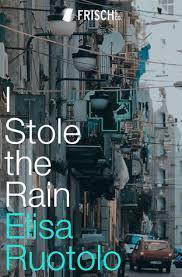I Stole the Rain, by Elisa Ruotolo and translated by Lisa McCreadle
Originally I was writing this up for an (overdue) August round-up post, but this was an unexpectedly good read and I think it deserves better than that. So, here’s a short post just on this.

I Stole the Rain is an ebook only short story collection published by Frisch & Co, who I think are now defunct but who specialised in translated European fiction.
Ruotolo is new to me and doesn’t seem to have much else in print in English. On the strength of the three stories here that’s rather a shame. Although short, I thought this one of the better short story collections I’ve read this year and the common setting – Campania in Southern Italy – adds to the interest.
The first, I am Super Legend, is about a young man who becomes a champion of the local village football league. He gets talent spotted for regional training, but can he adapt to the demands of the real game as opposed to the local variant he’s been used to?
The Black Eagles were a football team. Our team. Except it wasn’t signed up for any kind of tournament. It didn’t follow rules on transfers, first and second legs. As far as it was concerned there were no friendlies, half-times, or league tables. There was no nothing. Only a dirt pitch – nobody knew where it started and where it ended, it was all bumps and gravel, and if you fell on it, your knees would never be the same again – and two posts without a net that were put back up by a carpenter every time they fell down.
I have absolutely no interest in football. I never have had. Even so, I thought this just a blisteringly good story. Well written, evocative, and powerful. It leaves as many questions as it answers, as many of the best stories do.
The next, The Child Comes Home, is about an elderly woman forced by circumstance to take up her grandmother Candida’s old profession of buying gold under the counter in Naples and selling it illegally. In part it’s an exploration of the compromises forced on us by time, which makes it sound bleak save that it really isn’t.
The jewelers’ district had changed a bit, particularly the faces, and in the shops now it was easy to find the grandchildren, the employees, the new owners where someone had left. Only one place had stayed exactly the same, down to the tiniest detail, and an old man in a wheelchair, when he heard the name Candida, had turned around and asked what had become of her. The truth, obvious to many, had made him cry.
To add to that potential bleakness there’s the fact that the woman’s only son went missing as a child, leaving her bereft and leading to her husband walking out unable to cope with the aftermath. In a marvelous line she reflects on that disappearance having split her life “in two like an old fruit which falls to the ground when the season is over”.
The years passed and she slowly built up a new life for herself – a small life, but her own. Then a young man turns up at her door…
All this could be quite desolate, but it’s balanced with a quiet late-life romance she finds with an equally elderly man with a pacemaker and his own losses and late-night worries. I thought it all rather lovely.
The third story, Look at Me, was my least favorite. I suspect in another collection it would have seemed stronger, but after Super and Child it had a fair bit to live up to. It may be worth noting that the review in Words without Borders in contrast thought this the strongest.
A man looks back on his childhood, and remembers his father’s only friend, Cesare. Cesare was a big man, clumsy, socially awkward and with a speech defect that left him mute. He was also desperately lonely and his few attempts at dates were inevitable disasters.
Then Cesare fell in love with the housekeeper, Silvia, and lacking spoken words he wrote to her. The narrator, then a boy, found the letter and replied on her behalf. And with that was born a romance which meant everything to Cesare, and which Silvia was quite unaware of. I won’t say more.
This is a small book from a small publisher and it has no physical release. I don’t think it’s had that much attention – it’s simply very easy to miss. So, I can’t promise that anyone reading this would like the collection as much as I did, but I do think it at least merits taking a look at just in case you do.
